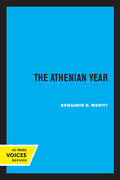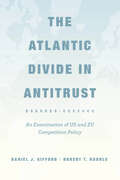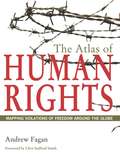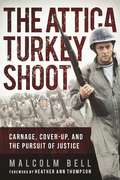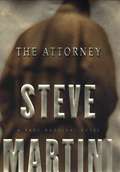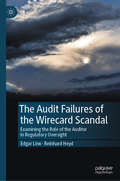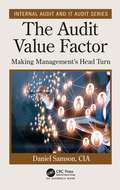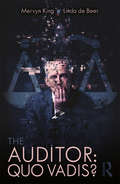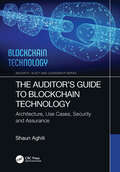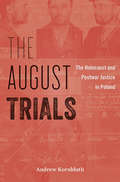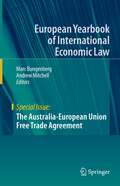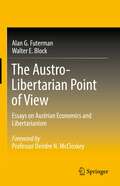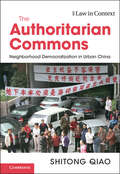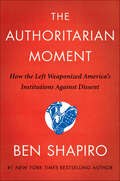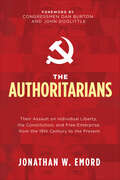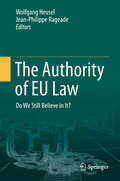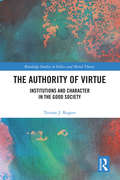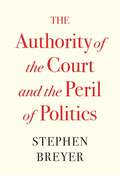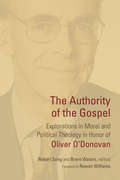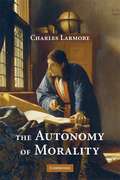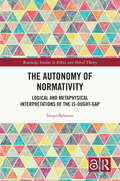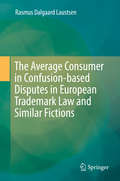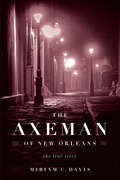- Table View
- List View
The Athenian Year
by Benjamin D. MerittThis title is part of UC Press's Voices Revived program, which commemorates University of California Press’s mission to seek out and cultivate the brightest minds and give them voice, reach, and impact. Drawing on a backlist dating to 1893, Voices Revived makes high-quality, peer-reviewed scholarship accessible once again using print-on-demand technology. This title was originally published in 1961.
The Atlantic Divide in Antitrust: An Examination of US and EU Competition Policy
by Daniel J. Gifford Robert T. KudrleHow is it that two broadly similar systems of competition law have reached different results across a number of significant antitrust issues? While the United States and the European Union share a commitment to maintaining competition in the marketplace and employ similar concepts and legal language in making antitrust decisions, differences in social values, political institutions, and legal precedent have inhibited close convergence. aaaaaaaaaaa With "The Atlantic Divide in Antitrust, " Daniel J. Gifford and Robert T. Kudrle explore many of the main contested areas of contemporary antitrust, including mergers, price discrimination, predatory pricing, and intellectual property. After identifying how prevailing analyses differ across these areas, they then examine the policy ramifications. Several themes run throughout the book, including differences in the amount of discretion firms have in dealing with purchasers, the weight given to the welfare of various market participants, and whether competition tends to be viewed as an efficiency-generating process or as rivalry. The authors conclude with forecasts and suggestions for how greater compatibility might ultimately be attained. "
The Atlas Of Human Rights: Mapping Violations of Freedom Around the Globe
by Andrew FaganIn the post-9/11 world, governments are using the threat of terrorism to justify tightening national security and restricting basic human rights. This timely book addresses the implications of this trend, revealing human rights inequities from nation to nation and the consequences of these inequities worldwide. Inspired by the United Nations' Universal Declaration of Human Rights, Andrew Fagan considers the nature of the state, national identity, and citizenship. His comprehensive and succinct text explores judicial violations and legal restrictions that permit state-sponsored torture, indefinite detention, capital punishment, and police brutality. Vividly illustrated with colorful maps and charts, The Atlas of Human Rights charts both the progress and limitation of free expression and media censorship. It displays the areas that are beset with wars, conflict, migration, and genocide; details the geographic status of sexual freedom, racism, religious freedom, and the rights of the disabled; focuses on women's rights, sex slavery, and the rights of the child. As intolerance threatens diversity on a global scale, The Atlas of Human Rights serves as a crucial intervention to preserving and extending freedom.
The Attica Turkey Shoot: Carnage, Cover-Up, and the Pursuit of Justice
by Heather Ann Thompson Malcolm Bell“Malcolm Bell’s powerful story of the Attica prison uprising . . . has the ring of truth” (Studs Terkel, Pulitzer Prize–winning author and historian). The Attica Turkey Shoot tells a story that New York State did not want you to know. In 1971, following a prison riot at the Attica Correctional Facility, state police and prison guards slaughtered thirty-nine hostages and inmates, and tortured more than one thousand men after they had surrendered. State officials pretended they could not successfully prosecute the law officers who perpetrated this carnage, and then those same officials scurried for shelter when a prosecutor named Malcolm Bell exposed the cover-up. Bell traveled a rocky road to a justice of sorts as he sought to prosecute without fear or favor—in spite of the deck officials had stacked to keep police from facing the same justice that had filled the Attica prison in the first place. His insider’s account illuminates the all-too-common contrast between the justice of the privileged and the justice of the rest. Also included in this book is evidence from recently uncovered tapes that Gov. Nelson Rockefeller knew his order for troopers to attack could cost the lives of hundreds of inmates and all of those hostages. The Attica Turkey Shoot highlights the hypocrisy of a criminal justice system that decides who goes to prison and who enjoys impunity in a nation where no one is said to be above the law.
The Attorney
by Steve MartiniSleuthing California defense counsel Paul Madriani lands one of his twistiest cases to date. His client, sport fisherman Jonah Hale, won $87 million in a lottery but lost his heart. Jonah's got custody of his eight-year-old grandkid Mandy, because his daughter Jessica is a cokehead party animal. Sprung from jail, Jessica demands cash. Jonah says no. So Jessica and Mandy disappear, with help from marital-rape-victim-turned-fanatical-activist Zolanda Suade. Suade's group, Vanishing Victims, specializes in thwarting courts and bashing rich males. Madriani tries to reason with Suade, who almost pulls a gun on him, then taunts him with a press release: Suade's going public with Jessica's charge that Jonah molested Mandy. Madriani's girlfriend works in Child Protective Services, so he gets a tidbit or two of inside info--the charge is phony, but because CPS can't comment on cases, the smear will suffice to ignite a media firestorm. When Suade turns up dead, media interest does not subside. In court, circumstantial evidence forms a tightening noose around Jonah's neck, and Madriani starts wondering whether Jonah did kill Suade. Also, underworld types who may know Jessica and/or a Mexican drug lord start stalking Madriani, and more corpses pop up. Martini, who covered the Manson trial, then became a lawyer and a bestselling novelist, is great at realistic, ingenious courtroom suspense, media-circus scenes, and dramatizing the impact of office politics on legal proceedings. His characters and prose are workmanlike but sturdy. Always grouped with lawyers-turned-writers Scott Turow and John Grisham, Martini thinks Turow's a better writer (in terms of character and dialogue), and Grisham's a natural-born storyteller who towers over all, but that he, Martini, is a better storyteller than Turow and a better writer than Grisham. The Attorney is evidence that he may be right.
The Audit Failures of the Wirecard Scandal: Examining the Role of the Auditor in Regulatory Oversight
by Edgar Löw Reinhard HeydWirecard was the largest economic scandal in the history of Germany. Following the collapse of Wirecard, numerous lawsuits, both criminal and civil by equity and debt investors, were filed not only against Wirecard but also against the auditor Ernst & Young. This book demonstrates that a proper audit in accordance with the auditing standards would have uncovered the fraud much earlier, and details what went wrong. The book first deals with the fundamentals of auditing and examines the Wirecard business models from a legal and economic perspective. Then, the book deals with the fiduciary structure, which there has been often debated. When the fraud was uncovered, it became clear that 1.9 billion Euros that were supposed to be in escrow accounts were not. The book discusses the balance sheet mapping in detail, including the related audit requirements and examines in which balance sheet item the amounts (allegedly) in escrow accounts should have been reported, before examining and weighing the corresponding income statement items. In each chapter, not only are the accounting requirements presented, but the requirements for audit measures based on the respective Standards on Auditing are highlighted and explained in detail. The book places the requirements for reporting in the context of the Wirecard case, and will be of interest to accountants, auditors, market regulators, and credit risk analysts alongside students of accounting/auditing.
The Audit Value Factor (Internal Audit and IT Audit)
by Daniel SamsonThe Audit Value Factor: Making Management’s Head Turn empowers readers with a systematic method to build and maintain a value-centric internal audit organization. The book explores how to identify, quantify, and articulate value for customers. It details six critical success factors: Value propositions that link directly to customer needs Fostering customer relationships using the CREATE model Talent development using the TEAM model Risk expertise that raises awareness, understanding, and action Change management and process optimization using the SMART model Data analytics that provide powerful insights to operations The Audit Value Factor offers easy to use tools and practical strategies that deliver tangible and immediate benefits for the internal audit team. Praise for The Audit Value Factor: Making Management’s Head Turn "Daniel Samson, the inspiring and forward-thinking CAE at SRI International, has created an essential guide to adding value through Internal Audit in his new book The Audit Value Factor. It's an important addition to any internal auditor's toolkit, with helpful suggestions on topics ranging from talent planning to data analytics. I highly recommend it to any internal audit professional looking to "up their game." Laurie A. Hanover, CIA, CAE Sunrun Inc. "Internal Auditors often strive for a ‘seat at the table,’ be it with Business Leaders, Senior Management, the Board, or really, any significant decision maker in an organization. In The Audit Value Factor, Dan Samson provides the roadmap to ensuring that Internal Audit gets not only that seat at the table, but also that role of a critical business partner that is valued in facilitating change and helping an organization achieve its goals." Brian Tremblay, CAE Acacia Communications "Great audit functions generate value and build leadership capacity from staff to CAE. The Audit Value Factor’s compelling examples, data, and actionable tools enable auditors at every level to build relationships of trust, ask the right questions, and deliver powerful insights to their organization." Dr. Kathryn Bingham, Executive Coach and CEO, LEADistics LLC
The Auditor: Quo Vadis?
by Mervyn King Linda de BeerThe audit profession is at a tipping point. Without significant innovation in its business model, staff recruitment strategies and audit execution processes, the audit profession may not remain relevant in the 21st century. The number of claims against auditors has significantly increased over the past twenty years due to the spate of corporate and audit failures early in the 21st century (Enron, Worldcom, Parmalat, etc.). Regulation to monitor professional and ethical standards has increased, leading audit firms to feel under even more financial pressure. In addition, the investor community is calling for greater insight and foresight from auditors. These challenges, coupled with the unlimited liability regime of auditors still applicable in many jurisdictions, are making audit firms and regulators nervous as to the systemic risk of another one of the Big 4 failing. And yet, the audit profession is in place to protect businesses, their wider stakeholder groups, including clients and investors, and society at large. Therefore, this book asks the important question about the profession’s future and engages a broad readership in the discussion of audit failure and reform. Intended to help readers to get up to speed with the issues and possible solutions quickly, this book assists directors, investors, business people and regulators, especially those with a non-financial background, to gain a greater understanding of the challenges and threats being faced by the audit profession, which in turn could disrupt the capital market and affect businesses across the globe. The book outlines the critical success factors needed for a sustainable audit profession.
The Auditor’s Guide to Blockchain Technology: Architecture, Use Cases, Security and Assurance (Security, Audit and Leadership Series)
by Shaun AghiliThe 21st century has been host to a number of information systems technologies in the areas of science, automotive, aviation and supply chain, among others. But perhaps one of its most disruptive is blockchain technology whose origin dates to only 2008, when an individual (or perhaps a group of individuals) using the pseudonym Satoshi Nakamoto published a white paper entitled Bitcoin: A peer-to-peer electronic cash system in an attempt to address the threat of “double- spending” in digital currency. Today, many top-notch global organizations are already using or planning to use blockchain technology as a secure, robust and cutting-edge technology to better serve customers. The list includes such well-known corporate entities as JP Morgan, Royal Bank of Canada, Bank of America, IBM and Walmart. The tamper-proof attributes of blockchain, leading to immutable sets of transaction records, represent a higher quality of evidence for internal and external auditors. Blockchain technology will impact the performance of the audit engagement due to its attributes, as the technology can seamlessly complement traditional auditing techniques. Furthermore, various fraud schemes related to financial reporting, such as the recording of fictitious revenues, could be avoided or at least greatly mitigated. Frauds related to missing, duplicated and identical invoices can also be greatly curtailed. As a result, the advent of blockchain will enable auditors to reduce substantive testing as inherent and control audit risks will be reduced thereby greatly improving an audit’s detection risk. As such, the continuing use and popularity of blockchain will mean that auditors and information systems security professionals will need to deepen their knowledge of this disruptive technology. If you are looking for a comprehensive study and reference source on blockchain technology, look no further than The Auditor’s Guide to Blockchain Technology: Architecture, Use Cases, Security and Assurance. This title is a must read for all security and assurance professionals and students looking to become more proficient at auditing this new and disruptive technology.
The August Trials: The Holocaust and Postwar Justice in Poland
by Andrew KornbluthThe first account of the August Trials, in which postwar Poland confronted the betrayal of Jewish citizens under Nazi rule but ended up fashioning an alibi for the past. When six years of ferocious resistance to Nazi occupation came to an end in 1945, a devastated Poland could agree with its new Soviet rulers on little else beyond the need to punish German war criminals and their collaborators. Determined to root out the “many Cains among us,” as a Poznań newspaper editorial put it, Poland’s judicial reckoning spawned 32,000 trials and spanned more than a decade before being largely forgotten. Andrew Kornbluth reconstructs the story of the August Trials, long dismissed as a Stalinist travesty, and discovers that they were in fact a scrupulous search for the truth. But as the process of retribution began to unearth evidence of enthusiastic local participation in the Holocaust, the hated government, traumatized populace, and fiercely independent judiciary all struggled to salvage a purely heroic vision of the past that could unify a nation recovering from massive upheaval. The trials became the crucible in which the Communist state and an unyielding society forged a foundational myth of modern Poland but left a lasting open wound in Polish-Jewish relations. The August Trials draws striking parallels with incomplete postwar reckonings on both sides of the Iron Curtain, suggesting the extent to which ethnic cleansing and its abortive judicial accounting are part of a common European heritage. From Paris and The Hague to Warsaw and Kyiv, the law was made to serve many different purposes, even as it failed to secure the goal with which it is most closely associated: justice.
The Australia-European Union Free Trade Agreement (European Yearbook of International Economic Law)
by Andrew Mitchell Marc BungenbergThis book gathers a selection of peer-reviewed chapters reflecting on the Australia-European Union Free Trade Agreement (AEUFTA). Since 18 June 2018, ten rounds of negotiations for a AEUFTA have been held in a constructive atmosphere, showing a shared commitment to move forward with this ambitious and comprehensive agreement. After a lengthy and arduous process interrupted by the United Kingdom’s withdrawal from the European Union (EU), the United States’ hesitations regarding the EU’s global strategy and the outbreak of the COVID-19 pandemic, the negotiations between Australia and the European Union finally appear to be nearing completion. In challenging times, both parties share a commitment to a positive trade agenda, and to the idea that good trade agreements benefit both sides by boosting jobs, growth and investment. This book explores the challenges, achievements and missed opportunities in the AEUFTA negotiation process, and examines current legal and political relations between the EU, its Member States and Australia. Furthermore, it examines in detail a wide and diverse range of negotiated areas, including digital trade, services, intellectual property rules, trade remedies and investment screening, as well as dispute settlement mechanisms. Lastly, it sheds light on the likely nature of future commercial relations between Australia and the EU. Written by a team of respected authors from leading institutions in both Australia and Europe, the book provides a valuable, interdisciplinary analysis of the AEUFTA.
The Australian Judiciary
by H P Lee Enid CampbellThe second edition of HP Lee's The Australian Judiciary provides a timely update to this seminal text. The only definitive survey of the entire Australian judiciary, this text describes and evaluates the work, techniques, problems and the future of the different tiers of courts and judges. It discusses the role of the judiciary as the third sector of government, and analyses and comments on judicial conduct, judicial independence and impartiality, the work of judges beyond the courts, the accountability of judges, and the dangers to judicial institutions. It is an excellent reference work which will appeal to legal scholars and practitioners throughout Australia and internationally.
The Austro-Libertarian Point of View: Essays on Austrian Economics and Libertarianism
by Walter E. Block Alan G. FutermanThis book covers several areas of economic theory and political philosophy from the perspective of Austrian Economics and libertarianism. As such, it deals with Epistemology and Methodology, Microeconomics, Macroeconomics, Labor Economics, International Economics, Political Philosophy, Law and Public Policy, all from the Austro-libertarian perspective.Hence, this book offers an integrated view of libertarianism and Austrian economics in the light of recent debates in the areas of economic science and political philosophy. Moreover, it builds from the foundations of the Austrian approach (epistemology and methodology), while the latter material deals with its application to the individual from the microeconomic perspective, which in turn allows an exploration of subjects in macroeconomics. Additionally, this work applies Austro-libertarianism to law, politics, and public policy. Thus, it offers a unified view of the entire approach, in a logical progression, allowing the readers to judge this perspective in full.Futerman and Block say that their book is not a manual, which I suppose it is not. But it is a collection of highly pertinent essays, from which you can understand what is mistaken in the orthodoxy of economics, law, and politics. The central term of art in Austrian economics is that phrase “human action.” It is the exercise of human will, not the blind bumping of one molecule against another or one organism against another, as in the physical sciences…Futerman and Block distinguish Austrian economics as a scientific enterprise based on liberty of the will from “libertarianism” as an advocacy based on policies implied by such liberty. “Although Austrian economics is positive and libertarianism is normative,” they write, “this book shows how both are related; how each can support the other.” Indeed they do.Deirdre N. McCloskey, PhDUIC Distinguished Professor of Economics and of History Emerita,Professor of English Emerita,Professor of Communication Emerita,University of Illinois at Chicago
The Authoritarian Commons: Neighborhood Democratization in Urban China (Law in Context)
by Shitong QiaoBased on six-year fieldwork across China including over 200 in-depth interviews, this book provides an ethnographic account of how hundreds of millions of Chinese homeowners practice democracy in and beyond their condominium complexes. Using interviews, survey data, and a comprehensive examination of laws, policies and judicial decisions, this book also examines how the party-state in China responds to the risks and benefits brought by neighborhood democratization. Moreover, this book provides a framework to analyze different approaches to the authoritarian dilemma facing neighborhood democratization which may increase the regime's legitimacy and expose it to the challenge of independent organizations at the same time. Lastly, this book identifies conditions under which neighborhood democratization can succeed.
The Authoritarian Moment: How the Left Weaponized America's Institutions Against Dissent
by Ben ShapiroNew York Times BestsellerHow far are Americans willing to go to force each other to fall in line?According to the establishment media, the intelligentsia, and our political chattering class, the greatest threat to American freedom lies in right-wing authoritarianism. We’ve heard that some 75 million Americans who voted for Donald Trump represent the rise of American fascism; that conservatives have allowed authoritarianism to bloom in their midst, creating a grave danger for the republic.But what if the true authoritarian threat to America doesn’t come from the political right, but from the supposedly anti-fascist left?There are certainly totalitarians on the political right. But statistically, they represent a fringe movement with little institutional clout. The authoritarian left, meanwhile, is ascendant in nearly every area of American life. A small number of leftists—college-educated, coastal, and uncompromising—have not just taken over the Democratic Party but our corporations, our universities, our scientific establishment, our cultural institutions. And they have used their newfound power to silence their opposition.The authoritarian Left is aggressively insistent that everyone must conform to its values, demanding submission and conformity. The dogmatic Left is obsessed with putting people in categories and changing human nature. Everyone who opposes it must be destroyed.Ben Shapiro looks at everything from pop culture to the Frankfurt school, social media to the Founding Fathers, to explain the origins of our turn to tyranny, and why so many seem blind to it.More than a catalog of bad actors and intemperate acts,The Authoritarian Moment lays bare the intolerance and rigidity creeping into all American ideology – and prescribes the solution to ending the authoritarianism that threatens our future.
The Authoritarians: Their Assault on Individual Liberty, the Constitution, and Free Enterprise from the 19th Century to the Present
by Jonathan W EmordThe untold story of how Authoritarians from the Progressive Era to the present removed all constitutional barriers to the deprivation of individual rights, upending the promise of the Declaration of Independence and inviting a new socialist state in America.
The Authority of EU Law: Do We Still Believe in It?
by Wolfgang Heusel Jean-Philippe RageadeThis book analyses the supposed erosion of the authority of EU law from various perspectives: legislation, jurisprudence of national supreme and constitutional courts, enforcement of Single Market rules, of EMU rules and of the rule of law. It discusses the interdependence between the perceived legitimacy of the European project and respect for the authority of EU law.
The Authority of International Criminal Law: A Controversial Concept (ASIL Studies in International Legal Theory)
by Clare Frances MoranDespite a wealth of literature exploring the issues surrounding it, the legitimacy and authority of international criminal law remain in question. Adopting a perspective informed by legal and political philosophy, Clare Frances Moran considers the authority of international criminal law, why it can be conceived of as more than simply an exercise of power and how that power may be exercised legitimately. Advancing existing scholarship on the subject, Moran explores the roots of the authority of law at the domestic level and tests these ideas in an international context. She examines sovereignty, complementarity and postcolonial issues, and how each impact international criminal law. By developing a theory on the authority of international law, Moran considers how it might be possible to adjudicate more effectively at the international level.
The Authority of Virtue: Institutions and Character in the Good Society (Routledge Studies in Ethics and Moral Theory)
by Tristan J. RogersThis book provides a unified account of the connection between justice and the good life. It argues that the virtues of character require institutions, while good institutions enable persons to live together virtuously. Although virtue ethics and political philosophy are rich and sophisticated philosophical traditions, there has been an unfortunate divergence, in theory and practice, between the virtues of character and the virtues of institutions. This book has two primary purposes. First, it reorients political philosophy around the concept of the good life. To do so, the author addresses the problem of political authority from a virtue ethics perspective. He also considers whether a political theory oriented around the good life is compatible with Rawls’s notion of reasonable pluralism. Second, the book explains the relationship between the virtues of institutions and the virtues of character. The author shows how institutions support the development and exercise of the virtues of character, while examining specific other-regarding virtues such as justice and friendship. The Authority of Virtue will appeal to scholars and advanced students working in virtue ethics, social and political philosophy, ancient philosophy, and political theory.
The Authority of the Court and the Peril of Politics
by Stephen BreyerA sitting justice reflects upon the authority of the Supreme Court—how that authority was gained and how measures to restructure the Court could undermine both the Court and the constitutional system of checks and balances that depends on it. A growing chorus of officials and commentators argues that the Supreme Court has become too political. On this view the confirmation process is just an exercise in partisan agenda-setting, and the jurists are no more than “politicians in robes”—their ostensibly neutral judicial philosophies mere camouflage for conservative or liberal convictions. Stephen Breyer, drawing upon his experience as a Supreme Court justice, sounds a cautionary note. Mindful of the Court’s history, he suggests that the judiciary’s hard-won authority could be marred by reforms premised on the assumption of ideological bias. Having, as Hamilton observed, “no influence over either the sword or the purse,” the Court earned its authority by making decisions that have, over time, increased the public’s trust. If public trust is now in decline, one part of the solution is to promote better understandings of how the judiciary actually works: how judges adhere to their oaths and how they try to avoid considerations of politics and popularity. Breyer warns that political intervention could itself further erode public trust. Without the public’s trust, the Court would no longer be able to act as a check on the other branches of government or as a guarantor of the rule of law, risking serious harm to our constitutional system.
The Authority of the Gospel: Explorations in Moral and Political Theology in Honor of Oliver O'Donovan
by Brent Waters Robert SongOliver O’Donovan is widely regarded as one of the preeminent Protestant Christian ethicists of our time. His teaching and scholarship have exerted a profound influence on countless moral theologians.This volume honoring O’Donovan shows how the various contributors -- themselves distinguished scholars -- have developed their own thinking through serious engagement with O’Donovan’s work. Significantly, they build upon, expand, and critique the agenda for Christian ethics that O’Donovan has been instrumental in constructing. As Robert Song and Brent Waters say in their introduction, “To genuinely honor O’Donovan, one cannot remain content with reciting but must risk one’s own exposition.”Contributors:Nigel BiggarBrian BrockJonathan ChaplinEric GregoryShinji KayamaJean-Yves LacosteJoan O’DonovanOliver O’DonovanRobert SongHans UlrichBernd WannenwetschBrent WatersJohn WebsterRowan WilliamsJohn Witte Jr.Holger Zaborowski
The Autonomy of Morality
by Charles LarmoreIn The Autonomy of Morality Charles Larmore challenges two ideas that have shaped the modern mind. The world, he argues, is not a realm of value-neutral fact, nor does human freedom consist in imposing principles of our own devising on an alien reality. Rather, reason consists in being responsive to reasons for thought and action that arise from the world itself. Larmore shows that the moral good has an authority that speaks for itself. Only in this light does the true basis of a liberal political order come into view, as well as the role of unexpected goods in the makeup of a life lived well.
The Autonomy of Normativity: Logical and Metaphysical Interpretations of the Is-Ought-Gap (Routledge Studies in Ethics and Moral Theory)
by Singa BehrensWhile the Is-Ought Gap has recently been a topic of growing interest, most contributions are firmly fixed on logical, often quite technical accounts of the autonomy thesis. This book defends two complementary autonomy theses—a modal and ground-based thesis—that provide a deeper and more comprehensive understanding of the nature of normativity.The autonomy thesis is often motivated by claims about the nature of the normative domain and its categorical difference from the non-normative domain. This book develops two novel interpretations of the autonomy thesis, one based on the notion of grounding and the other based on a notion of logical-semantic entailment, developed within a framework of truthmaker semantics. Together these accounts capture best the informal idea that we cannot ‘get’ something normative from the non-normative. The proposal is based on an analysis of what it means to say that certain propositional content parts are relevant to the instantiation of entailment and grounding relations. Moreover, the book relates the autonomy debate to other important metaethical debates, and it offers a more explicit account of the theoretical commitments of an autonomist position. Finally, it develops simple and elegant formal equivalents of the proposed autonomy theses which facilitate the evaluation of structurally complex proposed counterexamples, which have impeded a substantive autonomy debate.The Autonomy of Normativity will appeal to researchers and graduate students working in metaethics, metaphysics, and philosophical logic.The Open Access version of this book, available at www. taylorfrancis.com, has been made available under a Creative Commons Attribution-Non Commercial-No Derivatives (CC-BY-NC-ND) 4.0 International license. Funded by the Deutsche Forschungsgemeinschaft (German Research Council) through the Emmy-Noether Grant on Relevance (KR 4516/2-1), the European Research Council (ERC Grant 101040439, REASONS F1RST), and the Library of Bielefeld University.
The Average Consumer in Confusion-based Disputes in European Trademark Law and Similar Fictions
by Rasmus Dalgaard LaustsenThis book contends that, with regard to the likelihood of confusion standard, European trademark law applies the average consumer incoherently and inconsistently. To test this proposal, it presents an analysis of the horizontal and vertical level of harmonization of the average consumer. The horizontal part focuses on similar fictions in areas of law adjacent to European trademark law (and in economics), and the average consumer in unfair competition law. The vertical part focuses on European trademark law, represented mainly by EU trademark law, and the trademark laws of the UK, Sweden, Denmark and Norway. The book provides readers with a better understanding of key aspects of European trademark law (the average consumer applied as part of the likelihood of confusion standard) and combines relevant law and practices with theoretical content and other related areas of law (and economics). Accordingly, it is an asset for policymakers and practitioners, as well as general readers with an interest in intellectual property law and theory.
The Axeman of New Orleans: The True Story
by Miriam C. DavisFrom 1910 to 1919, New Orleans suffered at the hands of its very own Jack the Ripper–style killer. The story has been the subject of websites, short stories, novels, a graphic novel, and most recently the FX television series American Horror Story. But the full story of gruesome murders, sympathetic victims, accused innocents, public panic, the New Orleans Mafia, and a mysterious killer has never been written. Until now. The Axeman repeatedly broke into the homes of Italian grocers in the dead of night, leaving his victims in a pool of blood. Iorlando Jordano, an innocent Italian grocer, and his teenaged son Frank were wrongly accused of one of those murders; corrupt officials convicted them with coerced testimony. Miriam C. Davis here expertly tells the story of the search for the Axeman and of the eventual exoneration of the innocent Jordanos. She proves that the person mostly widely suspected of being the Axeman was not the killer. She also shows what few have suspected—that the Axeman continued killing after leaving New Orleans in 1919. Only thirty years after Jack the Ripper stalked the streets of Whitechapel, the Axeman of New Orleans held an American city hostage. This book tells that story.
